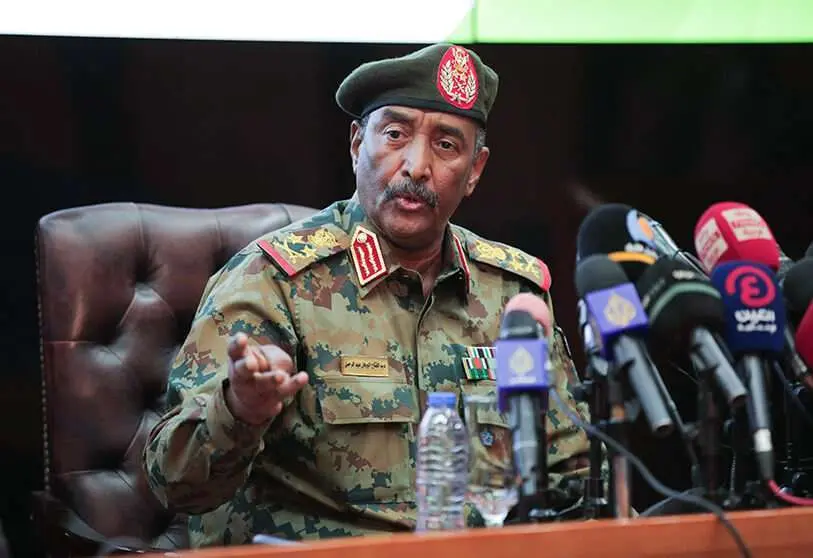Ethiopia-Sudan tensions over Al-Fashaga rise amid food crisis

After two years of tensions and low-intensity warfare, Ethiopia and Sudan are escalating rhetoric over the border region of Al-Fashaga as the latter's agricultural importance increases in the wake of Ukraine's invasion.
Last Wednesday, Lieutenant General Abdel Fattah al-Burhan, leader of Sudan's Sovereign Council, visited troops stationed in the region, calling them "the faithful guardian of the country's borders and its security and stability". A few months earlier, the Sudanese leader had vowed "not to give up an inch of Al-Fashaga's land".
The visit comes days after Ethiopian Foreign Minister Demki Mekonnen made controversial remarks in the Ethiopian parliament regarding its Arab neighbour. "Unfortunately, Sudan violated the border demarcation when we were busy with law enforcement in the north of the country," he said, referring to the Tigray war.

The Ethiopian diplomat also accused Sudan of carrying out displacement of civilians and destruction of property in an attempt to change the demography of the region. In addition, Mekonnen pledged to "restore the occupied territories by all possible means", although he stressed that Addis Ababa was committed to peaceful means.
The Sudanese foreign ministry responded by strongly condemning Mekonnen's statements as "false and misleading".
The 'breadbasket' of the Horn of Africa
Al-Fashaga is a disputed border area between Ethiopia and Sudan characterised by enormous fertility. It was established as Sudanese territory in a series of colonial agreements between the British Empire (then colonial power) and Ethiopia, but has since been a source of tension between Addis Ababa and Khartoum.
Although legally Sudanese, the territory was settled mainly by Ethiopian (mainly Amhara) farmers, who came to control the rich local agricultural sector, while Amhara militias connected to Addis Ababa and the Amhara State provided protection, making it a de facto Ethiopian territory.

Sudan and Ethiopia managed to reach an agreement in 2008, whereby Addis Ababa recognised Sudanese sovereignty over the territory and Khartoum pledged to respect Ethiopian citizens living in the region.
But with the change of government in Ethiopia in 2018, which saw the departure of the Tigray People's Liberation Front (TPLF), came a rise of the Amhara elites, on whom the government of Abiy Ahmed Ali, the 2019 Nobel Peace Prize laureate, relied heavily. They condemned the agreement carried out by the FLPT, claiming that the Amharas (the majority in Al-Fashaga) had not been consulted by a government then led by a Tigrayan party.
Finally, in 2020, the Abiy government launched a military offensive against Tigray (which borders the disputed region), a distraction that Khartoum took advantage of to deploy its army in Al-Fashaga after more than 26 years outside its control.
Since then, Sudanese troops have been accused of expelling Amhara farmers, and armed clashes against local militias and border tensions with Ethiopia have followed. According to the Sudanese Army, between November 2020 and August 2021, up to 84 Sudanese soldiers are reported to have been killed in combat in the region.
Rising bilateral tensions
Al-Fashaga's fertile land is enormously valuable in a region, the Horn of Africa, regularly hit by severe drought and famine.
This situation is exacerbated by Russia's maritime blockade of Ukraine, preventing the export of Ukrainian grain, which in 2020 had accounted for up to 30 per cent of Ethiopian imports and 5 per cent of Sudanese imports, and which has sharply increased the price of food on international markets.

There are widespread international fears that lack of access and rising food prices are at the root of a new wave of conflict in the most vulnerable regions, and Al-Fashaga could be one of these hotspots.
These tensions come on top of Ethiopia's accusations against Sudan over the Tigray war. Mekonnen denounced in his statements in parliament that Sudan was harbouring SPLF fighters to launch attacks against Ethiopian forces, which he equated with a "declaration of war". Since 2020, moreover, tens of thousands of Tigrayan refugees have reportedly crossed the border into Sudan to flee the war.
The two countries are also on opposing sides over the Grand Ethiopian Renaissance Dam, Abiy's flagship project to boost the country's development, located near Al-Fashaga. Here, Sudan has joined Egypt in denouncing the project, fearing that its access to Nile water could be reduced.
There is some fear that all these factors could escalate the confrontation between Ethiopia and Sudan. "The Al-Fashaga border region is a powder keg that threatens to explode," warns Federico Donelli, an expert on the Middle East and North Africa at the University of Genoa. "The combination of border disputes with ethnic tensions and resource nationalism means that Al-Fashaga is highly likely to become the next source of regional instability in the Horn of Africa.








